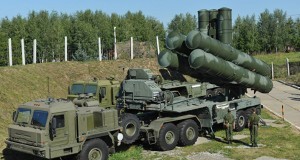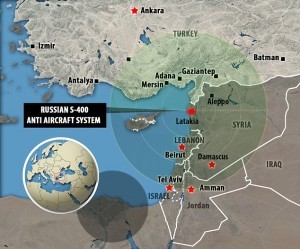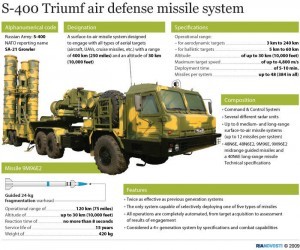Turkey is in a turmoil for quite a while now. Syria. PKK, the failed coup, the downing of the Russian fighter plane, tensions Greece, Cyprus, almost every neighboring country and lately with the Netherlands and Germany…
With this in mind and having as a fact that they have restored, at least partly, their relations with Russia, it would be interesting to see what they say about their alleged desire to buy from Moscow the S-400 Surface-to-Air missile system.
The following article is from the English edition of Hurriyet:
There is no doubt that everyone would prefer resources and technology to be directed toward welfare and the civilian economy rather than the defense industry and war equipment.
It should be the ideal of every contemporary person and country to produce tools that assist life, rather than spend money on arms. However, facts unfortunately do not fit ideals. Defense is a necessity for all countries. Humankind has never been able to form a society or model that does not need a defense system. Efforts remain limited to philosophy books.
So defense continues to be a requirement and Turkey’s need has recently increased. The threats that Turkey is facing call for further development and strengthening of the country’s defense force. In particular, the threat against Turkey’s national unity and territorial integrity has grown with the Syrian civil war.
It is this concern that now determines Ankara’s Iraq and Syrian foreign policy. The same concern lies behind its adjusting of its Syrian policy, standing up to the U.S. over the Syrian Kurdish PYD-YPG issue, and converging with Russia.
The U.S. meanwhile, has further fueled Turkey’s concerns. In an issue that Ankara defines as a national threat and a matter of survival, the Obama administration adopted a particular stance alongside the PKK-PYD-YPG front.
This stance from the U.S. is one of the key reasons why Ankara has recently been increasing its economic and military cooperation with Moscow.
Ankara has had to rethink due to the lukewarm stance of the U.S., NATO and EU countries against the heavy blows that Turkey is exposed to domestically and internationally.
Turkey, under constant missile threat, has a long NATO border, but Patriot air defense systems have been slow to be installed and were the first to be dismantled. NATO weapons, even heavy ones, are now circulating in the hands of PKK-PYD-YPG. Military explosives that are in the inventory of NATO countries are used in the middle of Istanbul. The apparent indifference of the West against the bloody July 15, 2016 coup attempt and finally, the U.S.-YPG military cooperation, have all directed Turkey toward alternative searches.
The search for an alternative air defense system outside NATO became clearer during President Tayyip Erdoğan’s visit to Moscow last week.
Erdoğan recalled that Turkey has been looking for air defense systems for a long time; proposals were taken from the U.S., France, China and Russia. He said works and talks were ongoing with Russia, adding that 2-400s were included in these works.
Upon criticisms that Turkey’s inclination toward purchasing S-400 or other non-NATO defense systems would not comply with the NATO concept, Erdoğan responded that “the fact we are member of NATO does not mean we are not independent.” He reminded that Greece was using Russian missiles.
“Everyone can form their own defense system. If we cannot provide these means within NATO, then we have to take care of ourselves. We can be a NATO member while also working with Russia,” he added.
There is no economic, political or military gain for the U.S., the EU and NATO in pushing Turkey toward Russia. Knowing this, Moscow is trying to reinforce the closeness it has caught in relations with Turkey and reflect it in the economic and military fields.
Compared to the U.S., Russia is acting more carefully and sensitively regarding Turkey’s sensitivities. The U.S., the EU and NATO should take this message from Turkey very seriously.
Ask me anything
Explore related questions







